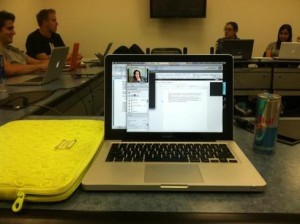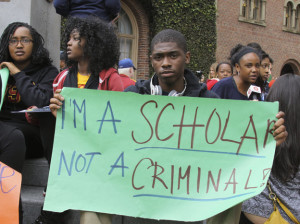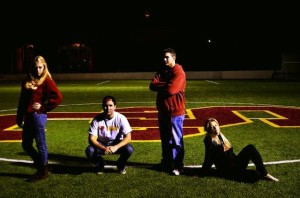/// a class that meets both on campus & via virtual classroom software ///
ANNENBERG COMM 340 – FALL 2013
CULTURES OF NEW MEDIA
9:30am – 10:50am
ASC 231 & via ADOBE Connect: links provided for each class session
INSTRUCTOR
Professor Kathi Inman Berens
T.A. Meryl Alper
OFFICE HOURS
Kathi Inman Berens: Tuesdays 11-12. Location: Inverted Fountain outside ASC East Lobby, or inside East Lobby. We can always schedule time via Google Hangout, or linger in the virtual classroom after class.
Meryl Alper: Thursdays 11-12. Location: Annenberg Patio.
COURSE OVERVIEW
This class focuses on communication practices central to New Media:
• Engagement
• Transmedia
• Mobility
These subjects work in tandem. They yield new insight into how ubiquitous computing changes communication among ordinary people, brands, networked communities and cultural institutions.
Unit 1 on “Engagement” asks: “What is the value of a ‘like’ or retweet?” Social media is fueled by databases. We’ll drill down on what that means for our expectations of privacy and how your “Quantified Self” is a commercial asset you don’t own.
Unit 2 on “Transmedia” focuses on how storytelling today moves across platforms and exhibits media-specific properties. Currently most transmedial stories bolster legacy media ad campaigns. We’ll study the Juried Winners of the 2013 Immersive & Interactive Emmys to take a close look at transmedia as
• story experiences unfolding across platforms; and
• part of a media ecosystem of networked publics.
In Unit 3 our discussion of “Mobility” will explore how ubiquitous computing extends beyond what we specifically do with our devices to alter many aspects of everyday life. We’ll look at stories being made & accessed with mobile devices. We’ll make a collaborative story of our own. We’ll ask: how does human/machinic collaboration affect what it means to be human? Is Sherry Turkle right that we depend upon devices to “edit” the public representation of our lives, and that embodied life without a “delete” function now makes us anxious?
LEARNING OUTCOMES
Students in this class will
• Become adept thinking & working in virtual environments
• Design presentations that blend image, text and spoken word cannily
• Collaborate virtually & f2f
• Understand evolving standards of privacy
• Meet media industry leaders & ask questions of them
• Situate social media in the broader medial ecosystem
• Examine how databases change ordinary life & commerce
• Build slides that convey arguments visually
OUR VIRTUAL CLASSROOM
This “Cultures of New Media” meets both “on ground” in ASC 231 and virtually, in our virtual classroom via ADOBE Connect. In my four semesters at Annenberg teaching in a virtual classroom, I’ve found learners enjoy toggling between these environments. They discover the unique capacities of each setting.
I teach face-to-face in ASC 231 one week each month. However, your actual face-to-face time in ASC 231 will be more like 50%, because you’ll do workshops in our classroom during some class sessions, which I lead virtually through our virtual classroom software. Meryl our TA will always be in ASC 231, so there can always be an embodied experience even when we’re meeting in our virtual classroom if you want it.
MANDATORY ATTENDANCE
Whether in the virtual classroom or ASC 231, I call on students. I love to learn your names, get to know your passions and help you become the best thinkers you can be. It’s a two-way street. I expect that you’ll come to every class prepared. If you’re not, your attendance grade will be impacted. If you miss more than three weeks of class (6 sessions), you may fail the class.
If you find yourself on Facebook or other non-classroom material during class for longer than 2 minutes, please tell me. We track “distraction.” Rather than judge it, we log our attention. Attention is a flow. I’ve found that students are highly engaged in the course material. If you’re not, let me know.
WE BUILD STUFF
You’ll produce work throughout the semester, authoring in Twitter, Prezi or Powerpoint and Photoshop (or the open-source Gimp). All computers at ASC are loaded with the Adobe suite; and Lynda.com software tutorials are FREE: click the button on your Blackboard page. You’ll collaborate with others and may learn some new software.
CONNECTIVITY
You’ll need to be on a network-connected device during class. Please enable your device’s mic and camera; the ADOBE software automatically prompts this, and I’ll make sure you all know your way around the software during the first week of class. Please update your Firefox and Safari browsers to the latest versions. Do not use Chrome: it causes problems with the ADOBE Connect software.
BIBLIOGRAPHY — many of these items are linked below. For a full list of readings, see Weekly Schedule.
Baio, Andy. “Kind of Screwed.”
Berens, Kathi Inman & Davin Heckman: “Use the # and Tweet Yr Escape.”
Blakely, Johanna. “Fashion’s Free Culture.”
Clark, Wendy. Keynote address at ad:techSF 2011.
ComScore. The Power of a Like. (2012).
Deterding, Sebastian. What Your Designs Say About You.
Doctorow, Cory. Various works.
Farman, Jason. The Myth of the Disconnected life.
Hayles, Katherine N. “How We Read: Close, Hyper Machine.”
Jenkins, Henry, Sam Ford and Joshua Green. Spreadable Media: Creating Value and Meaning in a Networked World [New York University Press, 2013].
Lessig, Lawrence. “Remix Culture.”
Koblin, Aaron. Various works.
Palmer, Amanda. “Trust People to Pay for Music.”
Pike, Scé. “The Internet of You.”
Turkle, Sherry. Alone Together: Why We Expect More From Technology and Less From Ourselves [MIT Press, 2012].
USC student authors of the USChangemovement social media campaign.
Vance, Nicki and Quinn Simpson. “The Future of Connected Thinking”
Plus many posts, videos and other media artifacts. See Weekly Schedule below.
GRADED ASSIGNMENTS
1000-point scale
Assignment #1: Engagement Best Practices Presentation: 150 pts.
Due in class Oct. 8 & 10
Assignment #2: Transmedia Researched Multimodal Essay: 400 pts.
Due dates:
• Annotated Bibliography due Nov. 7 (100 pts)
• 5 pages (half of full draft) due Nov. 19 (100 pts)
• Finished multimodal essay & 2-minute in-class presentations Nov. 26 (200 pts)
Assignment #3: Reflection on Cultures of New Media 200 pts.
Due Dec. 12
Participation, Quizzes, Attendance: 150 pts.
Reading Quiz: last day of classes Dec. 5th: 100 pts (10 questions, 10 pts each)
WEEKLY SCHEDULE
Week 1: Introduction to Engagement
Aug. 27, 29
in ASC 231
HW For Aug. 29:
1) Read ComScore White Paper about Facebook: “The Power of a Like”;
2) Watch 17-min. vid: Diversifying Participation by Henry Jenkins.
Thurs. Aug. 29
Discuss “The Power of a Like” and “Diversifying Participation.”
Week 2: Participation v. Privacy
via ADOBE CONNECT
Essays on datamining & privacy:
“How Google — and 104 other companies — Are Tracking me on the Web” by Alex Madrigal
“How To Get Privacy Right” by Nicholas Thompson
“The Curious Case of Internet Privacy” by Cory Doctorow
Thursday: introduction to Spreadable Media. Twitter Lab: mobile storytelling exercise done via Twitter.
Week 3: The Value of Engagement
in ASC 231
Sept. 10, 12
in ASC 231
Discuss Spreadable Media Chapter 1. Evaluate the reach & “spreadability” of our various #comm340 tweets send during our Twitter Lab.
Bring your own examples of “best engagement practices” for our workshop.
Engagement workshops: how to discover & analyze best engagement practices
Week 4 — Storytelling & Engagement; Aaron Koblin
Sept. 17, 19
via ADOBE CONNECT
Annenberg Innovation Lab: definitions of transmedial advertising; October 2012 Transmedia Think & Do.
TedX Talks by Aaron Koblin:
Creating Art with Data
Artfully Visualizing Our Humanity
Aaron Koblin‘s works: Wilderness Downtown, Single Lane Super Highway, Exquisite Forest.
Discuss these works. Spend about 30 minutes exploring “Exquisite Forest” and “The Single Lane Super Highway.” Think about the mechanics of engagement & participation. Think, too, about “where art meets commerce”: Koblin’s partnership with Google: he leads the data & arts team at Google’s Creative Lab.
Week 5 — Where Art Meets Commerce: Aaron Koblin visits our class!
in ASC 231
Sept. 24, 26
Aaron Koblin visits class Tuesday 24 September!
Thurs: T.A. Meryl Alper presents her work on mobile devices and accessibility.
Week 6 — Introduction to Transmedia
Oct. 1, 3
via ADOBE Connect
Tues: Chapter 2 of Spreadable Media
Thurs: Wendy Clark’s ad:techSF 2011 Keynote address. Wendy is Chief Officer of Integrated Marketing, The Coca-Cola Company. She is joined on stage by Renny Gleesen (Global Digital Strategies Director for Wieden+Kennedy). Vid is 1 hour.
In addition to Wendy’s talk, we’ll discuss these well-known Coke YT vids security cameras and happiness machine. We’ll discuss Coke Chase, the campaign Coke rolled out at Super Bowl 47. Finally, we’ll review these exemplary student analyses of Engagement: Team Coke Social Media Analysis and Reflection in which they integrate course reading into their analysis.
Week 7 — Your “Best Engagement Practices” Presentations
Oct. 8, 10
in ASC 231
Students present your “Best Engagement Practices” presentations.
Reading homework to be applied next week: Chapters 3-5 of Spreadable Media
Week 8 — Transmedial Storytelling-1: indie
Oct. 15, 17
via ADOBE Connect
Spreadable Media chapters 3-5
Lizzie Bennet Diaries
East Los High
For each of these projects, explore across platforms. Video will be dominant, because these are video stories. But attend to the transmedial elements. Expect to spend two hours per show in your explorations.
On Thursday, Oct. 17, some student leaders of the USChangemovement will visit class to talk about building a social media campaign to expose an incident of LAPD racial profiling that targeted them. They will also discuss positive subsequent change in our community, such as this street fair that united students and police.
Week 9 — Transmedial Storytelling-2: cable & broadcast
Oct. 22, 24
via ADOBE Connect
Chapters 6 & 7 of Spreadable Media
Grimm
Homeland
For each of these projects, explore across platforms. Note the differences in marketing and messaging between corp and indie transmedial stories. Expect to spend two hours per show in your explorations.
Week 10 — Copyright & Spreadability
Oct. 29, 31
Via Adobe Connect
Jonathan Coulton‘s cover of Sir Mix-A-Lot’s “Baby Got Back” is ripped off by Glee’s uncredited copy; see also this. Amanda Palmer’s 2013 TED Talk: “Trust People to Pay For Music”; Andy Baio, Kind of Screwed.
Thurs: Shervin Razaie, “Play Your Part: Girl Talk’s Indefinite Role in the Digital Sampling Saga” Touro Law Review 175 [2010-2011]. (This is a PDF KIB will send to you). Johanna Blakely, “Lessons from Fashion’s Free Culture”
Week 11 — Alone Together? The Robotic Moment & the Dangers of “Always On”
Nov. 5, 7
KIB leads via ADOBE Connect
Sherry Turkle, Alone Together: Why We Expect More From Technology and Less From Each Other Buy this book! We’re focusing on Part 2: “Networked: In Intimacy, New Solitudes” (pp. 151-305). Part 1, “The Robotic Moment” supplies excellent context and canvases her two previous book on self & computation. I strongly recommend that you read Part 1.
Jason Farman, “The Myth of the Disconnected Life”
Henry Jenkins, “‘A Necessary Conversation’ with Sherry Turkle.”
William Powers, NPR discussion about “Digital Sabbaths.”
Your annotated bibliography is due 11/7.
Week 12 — Going Mobile: Stories & Self
Nov. 12 & 14
Over the weekend read:
Jason Farman, Site Specificity, Pervasive Computing & the Mobile Interface
L.A.inundación: L.A. Flood on your laptop: Elizabeta Montana, Juan Dominguez, Ousmane, Rafael Huitzilin Tochtli.
Watch clips that contextualize L.A. Flood: the Rodney King beatings, Anna Deveare Smith’s TED talk (4 Characters from Twilight) and a docu called “Clash of Colors.”
Tuesday in ASC 231:
Site-specific storytelling: L.A. Flood
Thursday 24-Hour L.A. FLOOD TWITTER INSTALLATION
Location: where ever you are in L.A.
You’ll tweet from the POV of a character you invent as the Flood ravages LA in 3 stages: waters rising, catastrophic flooding, waters receding. Some L.A.inundación artists will join you in the installation! See how-to instructions in the g-doc and experience “situated storytelling” firsthand.
Week 13 — Researched essay draft workshop; How We Read; The Quantified Self & Internet of Things
Nov. 19, 21
Location of class meetings: Tuesday: ASC 231; Thursday: Adobe Connect
Tuesday in ASC 231: In-class 50% draft workshop; progress and quality are graded. You’ll work in small groups discussing your progress. During the second half of class, we’ll discuss Katherine Hayles, “How We Read: Close, Hyper, Machine.” Note: this link will load a PDF directly to your computer.
This lecture will aid you in understanding key concepts: Kathi Inman Berens audio lecture on Hayles’ “How We Read”.
Thursday via Adobe Connect
The Quantified Self & The Internet of Things
Scé Pike, The Internet of You
Sebastian Deterding: What Your Designs Say About You
Nicki Vance and Quinn Simpson: The Future of Connected Thinking
Week 14 — Researched Essays due & brief oral presentations; Thanksgiving
Nov. 26, 28
in ASC 231
Nov. 26 — Students summarize their essays for the class; then we’ll plan our “Cultures of New Media” collaborative media project!
Nov. 28: THANKSGIVING HOLIDAY
Week 15 — Our Cultures of New Media
In ASC 231
Dec. 3, 5
Bring your phones & other recording devices. We’ll make short videos about what we learned in COMM 340! You can integrate these videos into your final reflective papers/Prezis/Powerpoints.
On Thurs. Dec. 5, remember the in-class reading test: 10 questions, 10 points each.
ACADEMIC INTEGRITY POLICY
The Annenberg School for Communication is committed to upholding the University’s Academic Integrity code as detailed in the SCampus Guide. It is the policy of the School of Communication to report all violations of the code. Any serious violation or pattern of violations of the Academic Integrity Code will result in the student’s expulsion from the Communication degree program.
It is particularly important that you are aware of and avoid plagiarism, cheating on exams, fabricating data for a project, submitting a paper to more than one professor, or submitting a paper authored by anyone other than yourself. If you have doubts about any of these practices, confer with a faculty member.
Resources on academic dishonesty can be found on the Student Judicial Affairs Web site (http://www.usc.edu/student-affairs/SJACS). “Guide to Avoiding Plagiarism” addresses issues of paraphrasing, quotations, and citation in written assignments, drawing heavily upon materials used in the university’s writing program; “Understanding and Avoiding Academic Dishonesty” addresses more general issues of academic integrity, including guidelines for adhering to standards concerning examinations and unauthorized collaboration. The “2012-2013 SCampus” (http://www.usc.edu/scampus) contains the university’s student conduct code and other student-related policies.
Specific to This Class: For those assignments which require/allow collaboration, students are required to disclose all people who contributed to their process and identify all outside sources they drew upon in developing their answers. Failure to do so will be considered academic dishonesty.
DISABILITIES POLICY
Students requesting academic accommodations based on a disability are required to register with Disability Services and Programs (DSP) each semester. A letter of verification for approved accommodations can be obtained from DSP when adequate documentation is filed. Please be sure the letter is delivered to me as early in the semester as possible. DSP is open Monday-Friday, 8:30-5:00. The office is in Student Union 301 and their phone number is (213) 740-0776.







